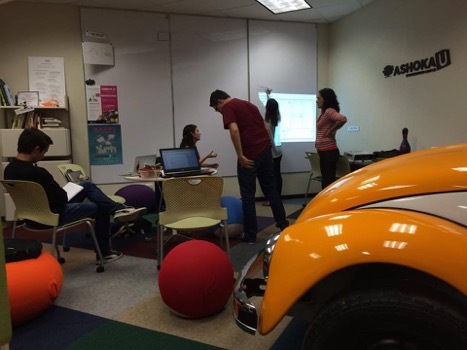It's no secret that today we face huge, seemingly unsolvable global problems that affect almost every part of our lives, from environmental issues, to lack of quality education, to political conflict. So, how can we know all this and not make any contribution to create a solution?
That was a question I started to wonder myself when I had the opportunity to be the organizer for the Hult Prize at my university, Tec de Monterrey, in Guadalajara, Mexico. The Hult Prize is not just an organization or an idea; it's a great effort made by incredible people to generate a new generation of social entrepreneurs. Every year, the Hult Prize, in partnership with the Clinton Global Initiative, identifies one of the world's biggest, most complex, and most catastrophic problems, with the goal that students from all around the globe will start to generate ideas and solutions to that problem, giving them the possibility to compete and win $1 million dollars to start implementing their business.
What I came to notice when I got involved as a campus director, is that there is an incredible amount of great ideas; ideas that could actually change the current global situation. The problem is that these people tend to think that their ideas are just silly or dumb, so they don't share it with their classmates, or even with their friends. Part of me was frustrated when I realized this, because I came to know a lot of these ideas in detail, but I knew that there was a good possibility that no one else ever would.
So I took a different approach. I started to encourage people to participate in our local competition by framing it differently: I told them that it would be just like playing, a way to relax, to get out of their routine, and at the end of the day, the worst thing that could happen was that could end up winning a million dollars.
The change I observed during the rest of our event lead-up was amazing - some people wanted to participate because they had a concrete idea of how to solve the challenge, but other people wanted to participate just to play some kind of game. And, to my surprise, those people playing "How can we change the world?" were giving really great ideas between jokes and laughing. When the participants saw this as a kind of game with no pressure, they became more creative, no longer concerned about other's opinions. They started to notice that those "dumb" ideas, were actually viable solutions to the world's biggest problems, and that a lot of people believed in them.
I am not saying that doing formal research is the wrong approach to address serious global issues, but what I am saying is that if you just take the time to listen to people having fun, and brainstorming freely, you may actually find the next brightest idea of the century. We live in a society that often times discourages new, "crazy" ideas, and worse, casts off those who proclaim them.
I encourage every one of you who is reading this, to please, participate in any social entrepreneurship event. Share your ideas -all of them- and most importantly, have fun, play just like you did when you were a kid: reckless, child-like, curious, imaginative, and without concern for what others are going to say. You will never know when an idea will strike your imaginative brain. We see kids doing this all the time; they solve their own problems with the resources they have, they build spaceships from boxes, they create castles with pillows and sheets, they let their imagination flow so they get new ideas on how to do something - why and when did we stop doing this, and why have we locked our imaginations? If we want a real change we need to get new ideas, and those new uninhibited ideas will most likely come from a person thinking out-of-the-box, playing, joking, and just letting his or her imagination take over.
One of the teams that participated at the local Hult Prize event. Just having fun giving random ideas in a place with the necessary creative environment, the "Central of Change" - Photo by Jorge Martínez Ponce de León
